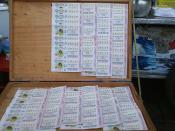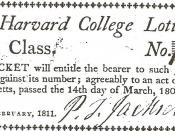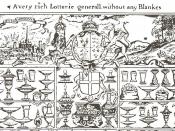Foreshadowing in The Lottery In the short story The Lottery, (reprinted in Perrine's Literature: Structure, Sound, and Sense, 7th ed. [Fort Worth: Harcourt, 1998] 421) Shirley Jackson depicts a special day, June 27, in the lives of the inhabitants of a small, apparently serene village. The use of foreshadowing is applied extensively to hint to the reader that despite the seemingly festive occasion, there is something morbid about the lottery that causes the people of the town to be uneasy. Jackson foreshadows the ironic conclusion with specific examples and both ominous and tense diction.
The earliest indication of the peculiarity of the day's lottery is the little boys had "already stuffed [their] pockets full of stones"ÃÂ (422). One knows that a lottery in modern societies definitely does not involve rocks, so the idea that the town's lottery is much different than the ones known in today's world is introduced.
The fact that the men who begin to gather for the lottery stand "away from the pile of stones"ÃÂ shows that the stones are not a jovial part of the day's events (422). These examples give the reader the idea that there is something important, yet shady about the pile of rocks. And although the men told jokes, "they smiled rather than laughed"ÃÂ (422). If the lottery was a carefree event, the men would have had no problem with laughing. The description of the actions of the group of men creates the impression that the lottery is a serious event which is not about laughing matters.
During the lottery, after most of the men had chosen and drawn their scrap of paper, they sat "turning them over and over nervously"ÃÂ (425). If the lottery was being conducted to give out some sort of reward or prize, they would have seemed...


